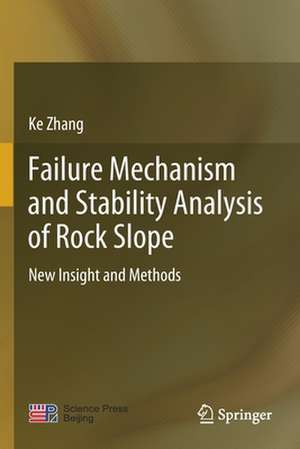Failure Mechanism and Stability Analysis of Rock Slope: New Insight and Methods
Autor Ke Zhangen Limba Engleză Paperback – 2 iul 2021
| Toate formatele și edițiile | Preț | Express |
|---|---|---|
| Paperback (1) | 890.39 lei 6-8 săpt. | |
| Springer Nature Singapore – 2 iul 2021 | 890.39 lei 6-8 săpt. | |
| Hardback (1) | 895.80 lei 6-8 săpt. | |
| Springer Nature Singapore – 2 iul 2020 | 895.80 lei 6-8 săpt. |
Preț: 890.39 lei
Preț vechi: 1085.85 lei
-18% Nou
Puncte Express: 1336
Preț estimativ în valută:
170.38€ • 178.34$ • 141.81£
170.38€ • 178.34$ • 141.81£
Carte tipărită la comandă
Livrare economică 01-15 aprilie
Preluare comenzi: 021 569.72.76
Specificații
ISBN-13: 9789811557453
ISBN-10: 9811557454
Ilustrații: XXVI, 248 p. 203 illus., 96 illus. in color.
Dimensiuni: 155 x 235 mm
Greutate: 0.43 kg
Ediția:1st ed. 2020
Editura: Springer Nature Singapore
Colecția Springer
Locul publicării:Singapore, Singapore
ISBN-10: 9811557454
Ilustrații: XXVI, 248 p. 203 illus., 96 illus. in color.
Dimensiuni: 155 x 235 mm
Greutate: 0.43 kg
Ediția:1st ed. 2020
Editura: Springer Nature Singapore
Colecția Springer
Locul publicării:Singapore, Singapore
Cuprins
Introduction.- Part I Experimental Studies on Compression-Shear Failure Mechanism of Rock Mass.- Joint Surface Morphology and Shear Behavior.- Influence of Flaw Inclination on Shear Fracturing and Fractal Behavior.- Influence of Flaw Density on Shear Fracturing and Fractal Behavior.- Part II Failure Mechanism and Stability Analysis of Heavily Fractured Rock Slope.- Method for Determining Strength Parameters of Heavily Fractured Rock Mass.- Kinematical Element Method.- Integrated Karst Cave Stochastic Model-Limit Equilibrium Method.- Strain-Softening Behavior and Strength Reduction Method.- Three-dimensional Effects.- Part III Failure Mechanism and Stability Analysis of Rock Slope Controlled by Major Geological Discontinuities.- Joint Element and Displacement Discontinuity Method.- Discontinuity Kinematical Element Method.- Joint Element and Strength Reduction Method.- Fracture Mechanics Method.
Notă biografică
Ke Zhang is an Associate Professor/Ph.D. Supervisor at the Faculty of Electric Power Engineering, Kunming University of Science and Technology. His main research fields are rock fracture mechanics, slope stability, and advanced numerical methods in engineering. He graduated from Central South University in 2015, and in 2016 he was selected for the “Excellent Doctoral Dissertation Award” by the Chinese Society for Rock Mechanics and Engineering, and took part in the Society’s “Young Elite Scientist Sponsorship Program.” In 2017, he was part of Yunnan Province’s “Thousand Talent Program for Young Outstanding Scientists.”
Textul de pe ultima copertă
This book presents in-depth coverage of laboratory experiments, theories, modeling techniques, and practices for the analysis and design of rock slopes in complex geological settings. It addresses new concepts in connection with the kinematical element method, discontinuity kinematical element method, integrated karst cave stochastic model-limit equilibrium method, improved strength reduction method, and fracture mechanics method, taking into account the relevant geological features. The book is chiefly intended as a reference guide for geotechnical engineering and engineering geology professionals, and as a textbook for related graduate courses.
Caracteristici
Helps readers understand the failure mechanism in rock slopes in complex geological settings
Covers laboratory experiments, theories, modeling techniques, and practices for the analysis and design of rock slopes
Offers a range of up-to-date approaches for solving complex rock slope problems with more rigorous theories
Covers laboratory experiments, theories, modeling techniques, and practices for the analysis and design of rock slopes
Offers a range of up-to-date approaches for solving complex rock slope problems with more rigorous theories
